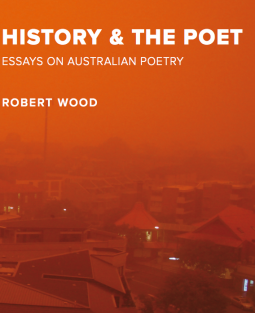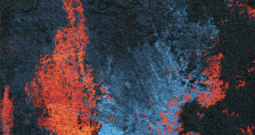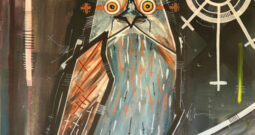from the editor's desk

Being Julajulara: A review of Robert Wood’s ‘History & the Poet’
Wood, Robert. History & the Poet. Melbourne: Australian Scholarly Publishing. 2017. RRP: $24.95, 157 pp. ISBN: 9781925588576
Chris Arnold
In his introduction to History & the Poet, Robert Wood explains that three questions lie behind these essays: ‘What is Australia? What is poetry? What is poetry in Australia?’ (ix). These ideas cover a bewilderingly broad territory, and History & the Poet explores as much as it can. Its thirty essays talk about poetry, poetics, history, language, culture, economics, identity, and lobsters. I kept looking for a thread that would tie the book together nicely for this review, but History & the Poet doesn’t sit still, and it never goes quietly.
There’s an interesting dynamic to Wood’s survey of what’s happening in poetry in Australia. He’s inclusive of everything that he sees: he talks about conceptualism, bush poetry, and performance poetry, but it seems likely that some readers will feel left out of the discussion, or misrepresented. This is probably inevitable—anthologising is a dangerous game in Australia (see for example criticisms of Australian Poetry Since 1788 from NewSouth Books, or Contemporary Australian Poetry from Puncher & Wattmann), and any writing on poetry that casts a wide net is probably open to similar sorts of criticism.
Despite this, Wood makes his perspective clear. In the essay ‘The New Reality in Australian Poetry’, he suggests: ‘The generation of Murray is not my generation. The generation of Adamson is not my generation either. Nor is it Tranter or Kinsella’ (70). The poetic landscape in this essay is forked between ‘re-formed realists’ like Bonny Cassidy and Corey Wakeling, and the hip-hop-inspired slam poetry of ‘sentimental radicals’. An acknowledgement of perspective is important for Wood; ‘The New Reality in Australian Poetry’ goes on to argue that the poet’s political activity is important: ‘how their private citizenship bleeds into their published (and hence public) language matters’ (77). The current existential threat is global warming, and Wood argues that ‘taking seriously a discourse of “country”’ (76) can be a part of the solution—poets are the hackers of language, capable of changing opinions, changing the way we do culture.
Wood’s focus on the local runs through History & the Poet. He advocates learning the language of country: how the crayfish sees all the plastic in the ocean as it swims backwards; how ‘rains come because of poems’ (9). He advocates learning the Indigenous language of one’s country, in his case Noongar. He is critical of other poets’ neglect for this world, the world in which those poets live. He acknowledges that it’s not easy—from whom do we learn, and how do we go about getting permission? But he argues that these difficulties are used as an excuse to stay wilfully ignorant. I think it’s a persuasive argument, and it’s the sort of thing that History & the Poet does well: it reminds us of the narrow lens through which most of us view the world. It is also a book that walks its talk. It introduces us to a few Pilbara words: mabarn, julajulara, and taruru, glossed at the back under the reference list. It is critical of essay writing that features ‘journalistic prose with emphasis on clarity’ (26) and breaks that mould: “On the Island of Beginnings” reads like the creation myth of a poem. As a whole, History & the Poet is multivocal, metapoetic.
The essay ‘Poetry Must be Stopped’ takes the form of a speech. In a platonic alt-Australia that’s declared war on poets, a public official tells us about the rising threat of poetry and what must be done to keep us all safe: ‘the National Poetry Threat level [has been] lifted to high’ because ‘sick poets are acting on the muse’s instruction to seize people at random and inspire them’ (117). It’s a very funny essay, but it’s also serious satire: the rhetorical moves are real, and the measures deployed to stamp out poetry, like metadata retention, are real. This essay points to the ways that rhetoric weaponises feelings of fear and betrayal: ‘Many are angry because all too often the threat comes from someone who has enjoyed the hospitality and generosity of our people’ (123). This, immediately before a section with the Orwellian name: ‘Control is Liberty’.
Figures woven through History & the Poet carry a dialogue about what it means to be a poet. There’s the ‘I’, the ‘Uncle Robs’ of the first essay, ‘Dear Nephew | Being Julajulara’ (1-3). This ‘I’ writes to a dear nephew about his place in South-Western Australia and julajulara, a species of inspirational belonging that dwells there (‘we do not need your duende here anyway’ (1)). The same ‘I’ believes that service to others is an important part of a good life, that the gift is a superior form of currency. Another incarnation is ‘The Poet’; the idealised figure that asks difficult questions of the working writer, the small-p poet, and instructs ‘the poet’ in his discovery of self and culture. In the book’s eponymous essay, The Poet tells the poet that he should bring out his dead; that ‘You will see them when you bring them.’ (7). This dialogue is the springboard for a discussion of history; what it means to inherit a place and culture.
History & the Poet is an unusual specimen of literary scholarship—it’s bold and creative. In Wood’s words, it is ‘part of [a] hopeful project and it touches on many discourses’ (xii). It is a book about poetry and how we read poetry in everyday life. There’s the brilliant idea of appointing an anti-poet laureate to cover up poetry in public places, serving to remind us how much poetry there is in our lives. And this book is part of the same project: it reminds us that poetry is for everyone, can be produced by everyone, and is a site for enriching our understanding of ourselves and each other.
Chris Arnold is poet from Perth. In 2017, he began a PhD candidate at the University of Western Australia, where he is researching and developing electronic literature. In the same year, he became the web editor for Westerly magazine.






[…] be a conversation with critic and author Robert Wood, whose new book History and the Poet we reviewed late last year, along with sessions on Shevaun Cooley’s Homing and David McCooey’s Star Struck. And […]